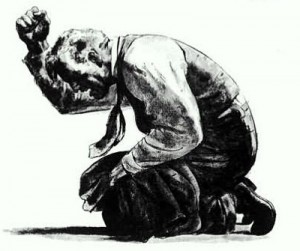Despite Willy’s claims that his sickness activates as a result of his two children, Biff and Happy, and his desire for them to meet success, his true sickness originates from his own personal flaws, those mainly being his poor judgment and weak character. Throughout the play Death of a Salesman, Willy is influenced by the media and seems to believe everything he hears.
Willy believes, for example, that his refrigerator should be top notch because Linda says, “[it] got the biggest ads of any of them” (Miller, page 36). One may take this idea as fact, and immediately assume that the media is the ultimate cause for Willy’s stress and, in turn, illness. Examined more in depth, however, and one could conclude that Willy’s problem is a deeper one, one which launches as a result of his weak character and poor judgment.
Willy Lowman’s character portrays a tremendous flaw, proving to be extremely detrimental to his life as a whole. This struggling salesman demonstrates very poor judgment that, had it been overcome, would have led him to a successful life free from illness.
This flaw is introduced at the very beginning of the play when he decides to view the lush country scenery while driving, rather than keeping his eyes on the road. This decision on his part leads its readers to wonder, “Why is he so fascinated by the scenery?”
The answer originates at Willy’s first decision in life, that being his career and choice of home. It is apparent from reading this play that Willy’s true calling would have been to work in the outdoors, in the “lush country scenery” that he so greatly admires in the first scene. Rather, Willy chooses a life in an urban city walled off by brick apartment buildings and drab, featureless streets.
Not only does Willy choose this life, but also fails to realize the mistake he has made. Moreover, he believes that, by following in his footsteps, Biff and Happy will meet success. When Biff proves to be heading on the right track by suggesting he become a carpenter, Willy’s response is, “Even your grandfather was better than a carpenter” (Page 48).
From this, we learn of Willy’s values. Being a suit-wearing salesman, Willy thinks of himself as more prestigious and better than a carpenter, regardless of the fact that the carpenter may make more money and lead a happier life than him. The main reason for the thwarting of his perception is his failed attempt at achieving the American dream.
Willy’s only goal in life was to build himself up with his own strength and become rich with his own two hands. He did not believe this could be done without going to work every day with a tie and briefcase. As a result of this poor judgment, Willy has made himself sick, rather than his claim that it is because of outside influences.
On top of his poor judgment, Willy also possesses an exceptionally weak character. He himself is the one to blame for his tendency to fall into the “media trap.” He demonstrates an inability to make decisions for himself. In Act one, Willy claims that the Chevrolet, “is the greatest car ever built (page 34).” Several minutes later, however, the same man claims that “they ought to prohibit the manufacture” (page 36) of that same car.
This contradicting behavior acts as proof that Willy doesn’t have his own personal opinions. Rather, he has any “opinion” that he is influenced to have. Willy’s behavior at the beginning of the play foreshadows the future, more severe behavior later on. Not long after this, Willy illustrates hallucinations where he dwells on the past and often about his brother Ben and how “when [he] walked into the jungle, [he] was seventeen.
When [he] walked out [he] was twenty-one. And, by God, [he] was rich!” (Page 52). Clearly, his brother didn’t make this money like any ordinary person, and this is why Willy was so attracted to it. By saying that he, Ben, just entered the jungle and exited 4 years later as a rich man, he is implying that he merely acquired the money and did no bona fide work in order to obtain it.
Willy, believing that this is the goal he should have, is put off and discouraged because he is aiming for this unreachable goal, the goal being the American dream. Because of Willy’s high expectations for a wealthy life, devoid of work, he has led himself to feel degraded and “little.” Because Willy brought on this feeling of utter melancholy with his clouded perception and weak character, he has led himself to physical illness.
Because of the terrible condition of Willy’s home and work life, it is easy for him to blame his stress and other problems on the things around him. Since he thinks so highly of himself and likes to deceive himself into believing that he is successful, it is obvious that he would never blame himself for these problems. Despite this, it is not hard for the play’s readers to realize that Willy’s illness has not come from Biff and Happy’s failures, his work, or his wife, Linda, but it has come from his own faults, weak character and poor judgment.

